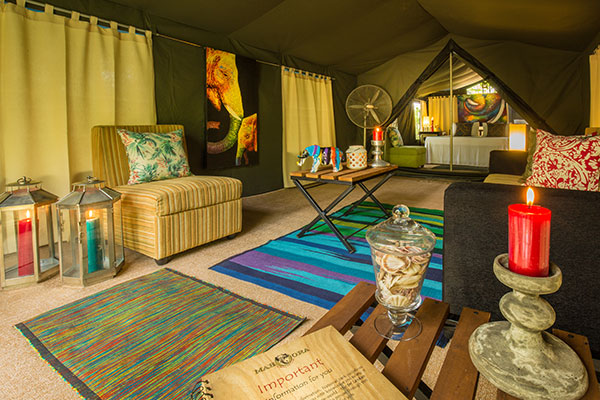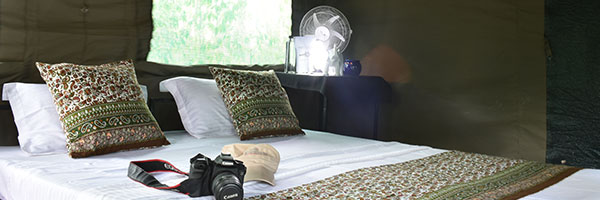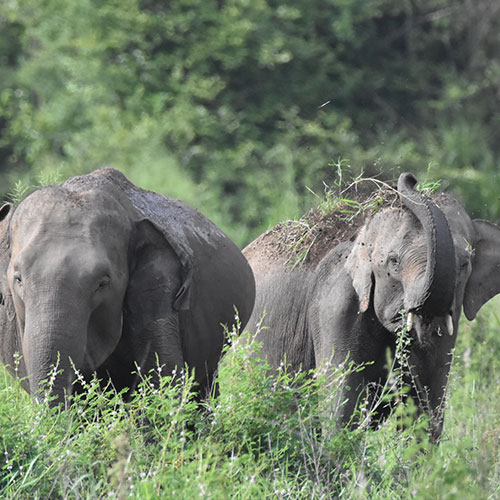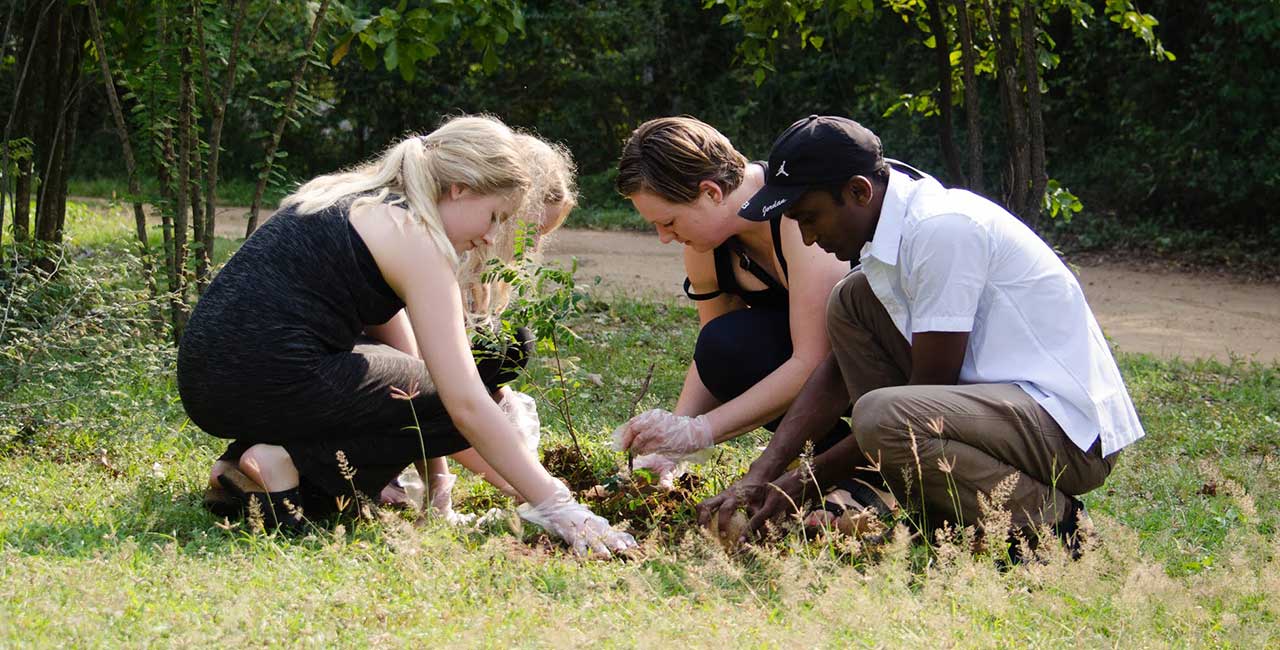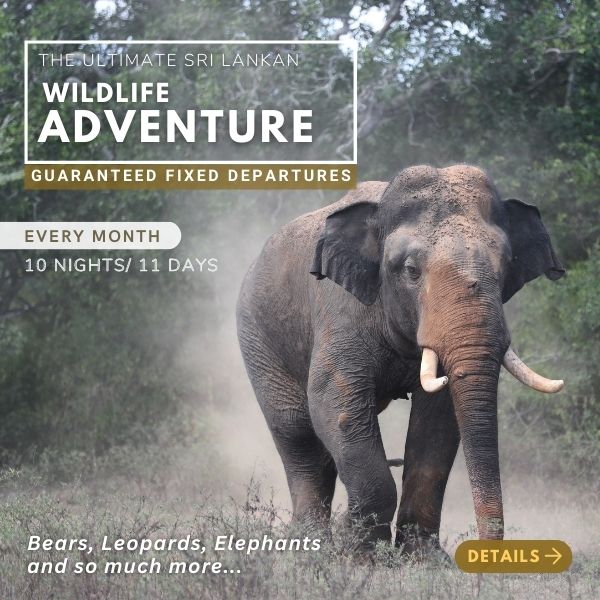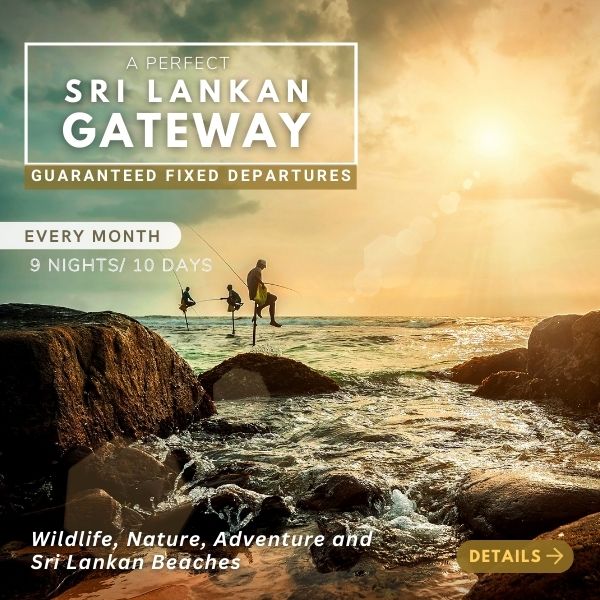Conservation & Eco C-R-E-A-M
Mahoora Camping – Ethically Luxurious
By choosing Mahoora you will not only enjoy a world class luxury tented safari experience, you will also directly be making a substantial contribution to our conservation efforts to protect Sri Lanka’s natural habitats and endangered species. Additionally, you will also be contributing to uplifting rural community tourism initiatives supported by Mahoora.
We became the world’s first operationally carbon-neutral "pack in - pack out" luxury tented safari operation by the end of 2011.
Sri Lanka’s First Carbon Neutral Safari Camp
We then offset their carbon footprint and our own operational footprint, enabling us to remain carbon neutral as an organisation. We in turn enable the customer to have no carbon footprint in the component that we provide in their holidays.
We have purchased a bank of UN certified carbon credits or CERs (Certified Emissions Reductions) and hold it in one of the carbon registries. We have ensured that the credits we have purchased have an ethical value addition. For example, the project activity that produced the credits will be from an activity that has enhanced communities or the environment, as opposed to the destruction of industrial gases. We are retiring the credits in blocks of 10 tonnes of carbon (10 credits at a time).
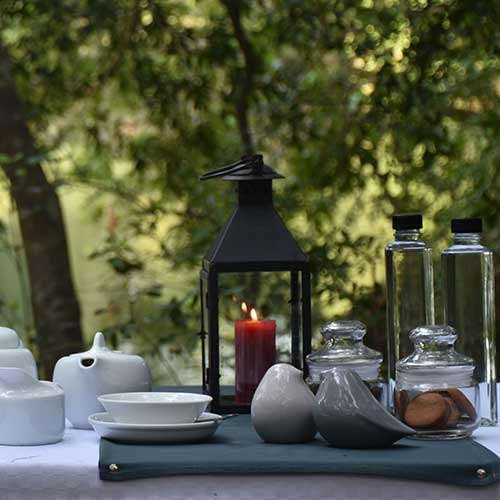
The value creation process through the adoption of a climate change strategy
Value Creation
Who will see value in a Mahoora Climate Change Strategy?
Our preparedness as a supplier will enable us to adapt quickly and efficiently to required levels of disclosures on Green House Gas (GHG) emission levels by international customers and tour operators.
Brand Value in Leading the Industry
Sri Lanka Positioning
Cost Savings
The world is converging on adopting operational models that minimise Green House Gases much sooner than anticipated due to global accountability to climate change risk. Therefore, early adoption will preclude inconsistent modifications and allow us to remodel our existing capacities and build our future operations and new products in line with emerging climate compliant customer requirements.
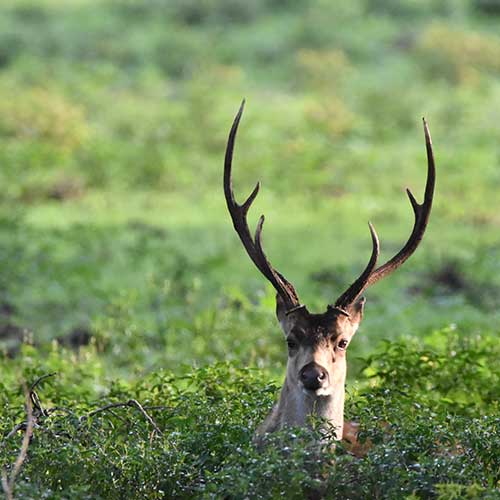
Niche Market Sales Growth
We believe that adopting a climate change strategy at an early stage will allow us to provide differentiated product categories that are capable of attracting a niche consumer base globally. A clearly defined emissions strategy and reporting mechanism will add quantifiable value to our glamping Sri Lanka product base.
- Operational action will translate into bottom-line returns.
- A competitive and efficient operational model will eventually benefit and increase our profitability.
- Influencing our suppliers to integrate into our climate change strategy, will add value to our products. This will be an important mandate that we think will pay for itself, as becoming a pioneer in the climate change action space within the industry enables us to influence our customers and seek to establish potential alliances with supply chain partners who will also want to leverage off our early mover advantage.
Mahoora Climate Change Strategy
All holidays and travel itineraries sold by MCCS will have an individual carbon footprint audited in accordance with internationally recognised standards.
MCCS will be able to introduce competitive low carbon products to its customers as a result of:
- Implementing efficient energy switching mechanisms
- Implementing recommended energy saving measures
- A quantifiable emissions footprint on each holiday and activity, enabling offset
Mahoora Climate Change Awareness Campaign
What is Climate Change?
The earth’s atmosphere naturally contains greenhouse gases that absorb infrared energy that warms the earth’s surface. However, over the past few decades, increased human activity has resulted in increased emissions from sources such as industry and travel, adding greenhouse gases to the atmosphere making the earth warmer, leading to changes in climactic conditions around the world.
The Energy Connection
The amount of carbon dioxide produced depends on the carbon content of the fuel. Fossil fuels supply 60% of the primary energy consumed in Sri Lanka and are responsible for a majority of emissions of carbon dioxide.
Therefore, every time we consume electricity or travel in a gasoline-fuelled vehicle, we produce carbon dioxide. As such, the less energy is consumed, the fewer fossil fuels are burnt and the lower our greenhouse gas emissions levels will be.
Measures to become energy efficient help increase company profits and reduces our impact on global warming.
What is a Carbon Footprint?
The carbon footprint is a measure of the exclusive global amount of carbon dioxide (CO2) and other greenhouse gases emitted due to human activity or accumulated over the full life cycle of a product or service.
How will climate change affect you?
In business:
- Businesses tend to lose their competitive edge if they are ignorant with regard to climate issues.
- Increasing regulation of businesses will mean increasing regulatory risk for businesses who fail to comply.
In your personal life:
- Impacts job security if business competitiveness is threatened due to regulatory risk and failure to comply.
- Extreme weather conditions that could cause damage to homes and businesses.
- Severe impacts on agriculture, food, and water availability due to prolonged droughts.
- Increased prevalence of disease and illness due to the warmer climatic conditions.
How will action on climate change be beneficial to us?
Business:
- We will be more competitive in the global tourism industry, as we will be visible as a carbon-neutral organisation.
- The ability to approach new markets and gain early specialisation in “low carbon” products.
- Ability to effectively use cost-efficient and sustainable processes in delivering experiences to our customers.
- Greater compliance with expected future regulations by local and international bodies.
For our team:
- Better working conditions.
- Healthier and therefore happier lifestyles.
- Creating a better environment for the future.
How you can contribute to lower your carbon footprint
Small lifestyle changes can have a significant impact on GHG emissions and can go a long way in reducing your carbon footprint. Listed below are some practical steps.
At home and at work
Save electricity:
- Turn off lights, ceiling fans, and air conditioners when not needed.
- Use energy-efficient lighting. Compact fluorescent lamps last 10 times longer than ordinary incandescent light bulbs and use only a small proportion of the electricity.
- Make it a habit to turn appliances off rather than leaving them on standby. It is a common misconception that appliances on standby consume a very small amount of energy. It has been shown that a television on standby can use up to half as much as electricity as it does when it is switched on.
- Dry clothes using natural sunlight and wind instead of using a dryer.
- Only boil the amount of water needed when making hot drinks.
Reduce travel:
- Avoid using your car for short or unnecessary journeys.
- Take public transport whenever possible.
- Travel with one or more people going the same way, which will take their cars off the road. Car Pooling is highly recommended.
- Use less congested routes and avoid rush hour.
Recycle:
Recycling glass and paper saves a lot of energy and raw materials, and cuts down on pollution and causes less of an impact for the environment.
Our conservation efforts
Mahoora contributes 1% of its revenue to the Sri Lanka Wilderness Foundation to work on selected projects such as minimising leopard deaths due to the human leopard conflict.
Doing business ethically
We at Mahoora aim to lead by example, and we ensure that our business has long term benefits for our local communities, the environment and our customers. The philosophy of Mahoora is to develop and promote, ethical, responsible and sustainable luxury tented holidays, thereby creating jobs and income for our communities, whilst minimising our impact on the environment and our planet’s natural resources. We have developed our own Environmental and Social Sustainability Policy, as a guide to our continuing journey.
Eco Community-Responsibility-Environment-Awareness-Management (C-R-E-A-M)
We at Mahoora are governed by Eco Team’s Environment & Community Policy.
“We at Eco Team aim to re-invent the tourism model in Sri Lanka by staying ahead to ensure that our business has a long term benefit for our communities, the environment and our customers. We believe that the people, our community, are central to any strategy that involves protecting the environment and its communities.
More than any other tour operator and safari vacation provider in Sri Lanka, we depend on the unspoilt and pristine outdoors of this magical island to run our business. Our wilderness and ecosystem is our heartbeat, therefore protecting our most important resource is not only a responsibility but a necessity for our own existence as a company.”
Some of the key components of Eco C-R-E-A-M:
Community Responsibility
We recruit and train staff from the locality we work in and purchase locally produced goods and services.
We build products around the local community knowledge in fauna, flora and farming methods.
We support community tourism initiatives by incorporating community lifestyles seamlessly into our programmes, such as picnic stops in village homes and fishing with local fisher communities etc.
We work towards capacity building in schools, communities, in entrepreneurship, knowledge farming and value additions.
We, along with our clients, contribute financially to uplift the standards of the underprivileged schools, children’s homes, homes for the elders, hospitals and places of worship.
Wildlife and the Environment
We protect endangered species in line with the red list issued by the ICUN.
We actively educate our communities and campaign against animal abuse of all forms. We educate and invest in protecting our fauna and flora whilst supporting development projects including environment education, wildlife conservation and reforestation as we work closely with the Sri Lanka Wildlife Foundation.
We discourage the collection, removal or cutting of any plant or plant parts (seeds, roots or leaves) by our customers, staff and communities.
We participate in programmes that involve the removal of invasive species such as cactus and lantana, whilst setting up our operations with scientists in and around the National Parks for reforestation activities.
We have launched conservation programmes for the protection of endangered species. Our clients are also welcome to actively participate in these endeavours.
Waste Management
We avoid using products packaged in plastic, in keeping with our plastic-free philosophy. The biggest challenge that we face is the lack of an alternative to the PET water bottles used. However, all empty bottles are being collected and sent to the Balangoda Town Council Recycling Centre.
We convert all organic waste into compost waste.
All paper, cardboard, aluminium and metal waste is collected separately and recycled through the Balangoda Town Council Recycling Centre.
Energy
We recycle used coconut shells for BBQ’s and campfires. Wood for the campfire is collected from the surrounding area, no trees are cut for this purpose. At our frequented camps, LPG gas is used for hot water while all the camps are run on Solar Energy (Nett Metering). At our less frequented camps, we use rechargeable fans, and illumination inside the tents are done using solar lamps.
Our research projects
Mahoora Safari Sri Lanka actively supports minimising human leopard conflict in the border areas of the parks, and the active participation of soloist clients. At the end of a safari, our clients fill a research document on their own sightings and this data will be used for important planning and conservation activities.
For more information Sri Lanka Wildlife Conservation log on to www.srilankawilderness.org



